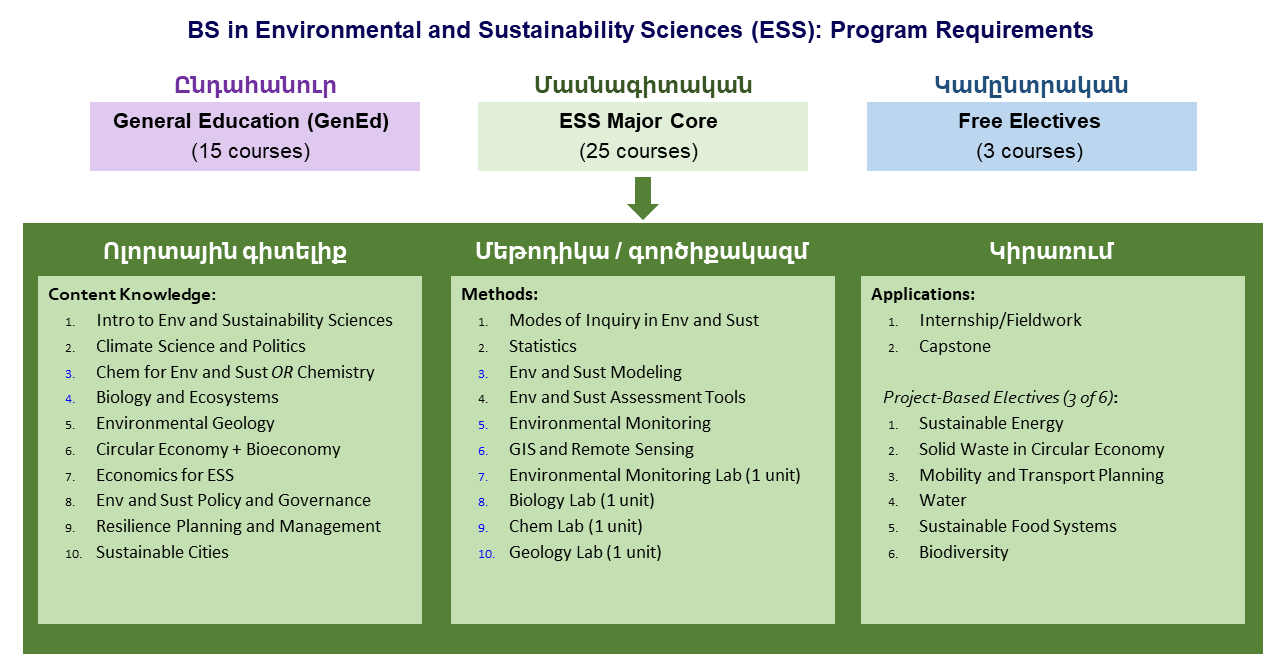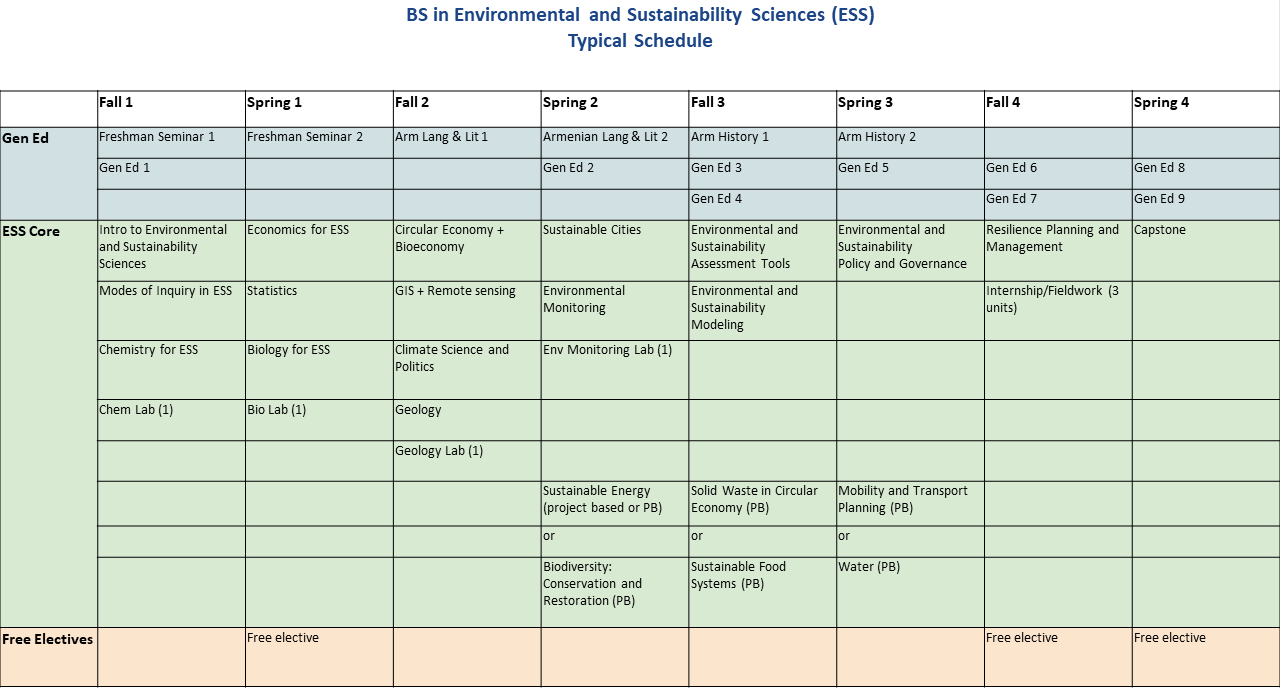All AUA undergraduate degree courses fall into 3 categories:
- General Education (15 courses)
- Major Core Courses (25 courses for ESS)
- Electives (3 courses for ESS)
See table below for the ESS Core Courses, which, in turn, fall into 3 categories:
- Content Knowledge
- Methodology and Tools
- Applications and Solutions

An ESS student's typical study schedule over a 4 year period is shown in the chart below.

PG 1: Provide students with the knowledge of concepts, theories, and tools to explain and manage environmental systems, both natural and human-made, in pursuit of sustainability.
SLO 1.1. Demonstration ability to critically evaluate human impacts on the planet’s climate system, biodiversity, biogeochemical cycles, water cycle and resources, land, and other related systems.
SLO 1.2. Demonstrate ability to critically evaluate sustainability of urban environments, including urban alignment with nature, mobility and energy solutions, air quality, use and disposal of water, waste and circular economy, disaster resilience, and more.
SLO 1.3. Ability to apply relevant impact assessment, evaluation, research, mapping, and analytical tools prevalent in environmental and urban sustainability management.
PG 2: Train students in methods and modes of inquiry that lead to well-substantiated decisions on sustainability
SLO 2.1. Apply the scientific method and demonstrate competence in numeracy including data collection and analysis.
SLO 2.2. Skills in systems and design thinking, including participatory and deliberative methods of stakeholder engagement.
SLO 2.3. Ability to assess sustainability challenges from global, cross-border, national, and local perspectives.
PG 3. Prepare students for careers in research, management, and innovation on sustainability
SLO 3.1. Apply sustainability knowledge and methods to one or more domains of application (e.g. business, industrial/energy sectors, logistics, finance, policy, international relations/cooperation, urban development, and more).
SLO 3.2. Demonstrate skills for adaptability in the rapidly evolving fields of environment and sustainability, critically assessing and applying state-of the art knowledge, approaches, and techniques.
SLO 3.3. Demonstrate professional and ethical responsibility in areas such as business, government, civil society, research, and international relations/cooperation.
PG 4: Develop articulate, conscientious leaders and problem solvers who are committed to contributing to their fields and society.
SLO 4.1. Produce and deliver written and oral presentations and communicate with specialists and non- specialists using appropriate media and technology.
SLO 4.2. Think critically and creatively, conceptualizing real-world problems from different perspectives.
SLO 4.3. Work productively in diverse teams and solve problems collaboratively.
PG 5: Provide students with a broad foundation of knowledge and skills and cultivate a commitment to life-long learning.
SLO 5.1. Use common software and information technology to pursue inquiry relevant to their academic and professional fields, and personal interests.
SLO 5.2. Weigh evidence and arguments and appreciate and engage in diverse modes of inquiry that are characteristic of historical, cultural, political, economic, and quantitative disciplines.
SLO 5.3. Properly document and synthesize existing scholarship and data, keep current with developments, conduct independent research, and discover and learn new material on their own.
For details on the admission requirements, visit https://admissions.aua.am/ugrad/.
Some admission highlights for this degree program:
a) AUA practices holistic admissions. We select students who have the skills and ability to succeed in their studies and for whom AUA is well suited to their educational and career goals. Once a student submits an application, it is screened for technical eligibility. If eligible, the Undergraduate Admissions Committee will conduct a thorough review of the application. See the undergraduate Admissions website for more.
b) Holistic admissions notwithstanding, there are minimum scores required to be considered for admissions. We call this the "auto-denial thresholds." Receiving a score at or below the threshold will result in automatic denial of the applicant. For the Bachelor in ESS, the auto-denial thresholds are:
English auto-denial thresholds
-- TOFEL iBT score of 67 or below
-- IELTS Academic score of 5.5 or below
Math auto-denial thresholds
-- SAT score of 620 or below
-- ACT score 26 or below
Note that these are the minimum requirements with respect to scores on standardized tests. The average scores of students admitted are higher than these thresholds. Also, there are other entry requirements students have to satisfy. For details visit, https://admissions.aua.am/ugrad/selection/.
Admission to AUA is need blind. This means that admission decisions are made based on the academic merits of the student. If the student needs support to finance their education, the AUA Office of Financial Aid (finaid.aua.am) works with students to find sources. AUA students can receive Tuition Assistance and/or Scholarships. See links below for details.
Applicants and students eligible for need-based aid should apply for it by submitting the financial aid application/package according to the published deadlines to the AUA Office of Financial Aid.
For more information, contact a Financial Aid Counselor at financialaid@aua.am for a personal consultation.
Types of financial assistance available to AUA students:
1. Tuition Assistance
https://finaid.aua.am/tuition-assistance/
2. Scholarships
https://finaid.aua.am/scholarships/
3. Kakosian Family Scholarship for Students from the Regions in Armenia and Artsakh (covers up to 100% of tuition but students would have to focus part of their studies on issues related to the regions or Artsakh)
Find out more about this Scholarship from a Financial Aid Counselor at financialaid@aua.am
4. External Scholarships (non-AUA but may be available to AUA students)
https://admissions.aua.am/external-scholarships/
INTERNSHIPS: ESS students will have opportunities to gain degree-relevant practical experience as an integral part of their studies. The practical experience can be in the form of internships in companies, banks, government agencies, NGOs, or international organizations. ESS students will also have opportunity to become engaged in research and complete internships at the AUA Acopian Center for the Environment, one of the premier research and community outreach centers in Armenia.
WORKING IN THE ARMENIA'S REGIONS: Students can gain invaluable experience by applying what they've learned in the ESS program to understanding and addressing sustainability challenges in the Armenia's regions (Marzes). ESS will offer opportunities for interested students to have extended practical experience working in the regions.
STUDY ABROAD: Studying abroad can expand a student's world view and expand their horizons. AUA offers study abroad opportunities highlighted in the website of the AUA Office Student Affairs (https://studentaffairs.aua.am/opportunities-to-study-abroad/). In addition, the ESS program will continuously look to expand study abroad opportunities for its students.
Students graduating from this program can continue their education in a number of fields including sustainable energy transitions, transportation planning, water management, circular economy and waste governance, environmental management, and more.
Students can also work in a wide range of enterprises including local and national governmental agencies, international organizations, financial institutions, industrial operations, and consultancy firms.
